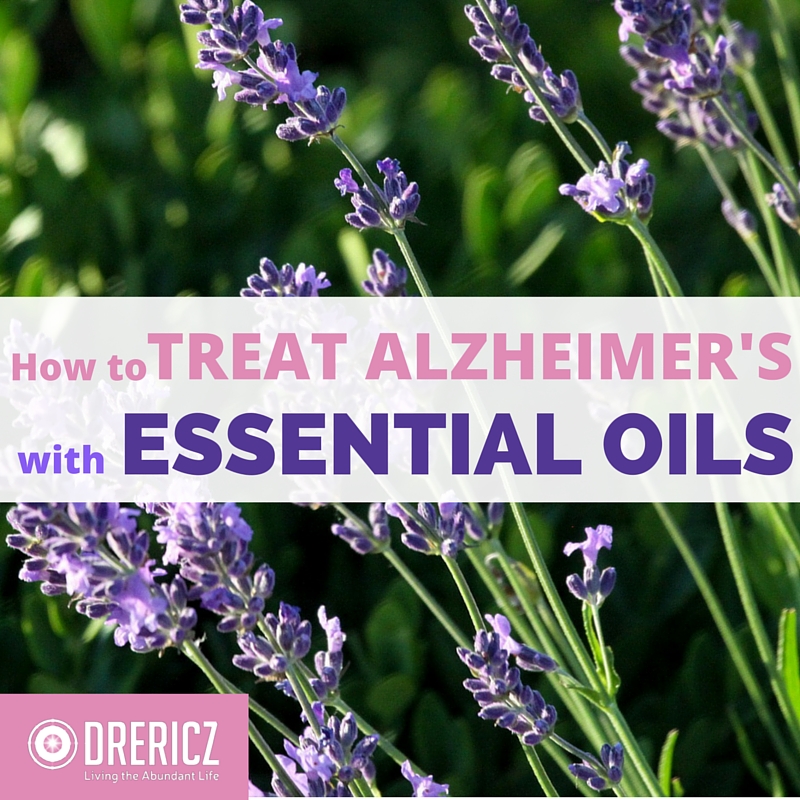Click here to sign up for the “Essential Oils for Abundant Living: 10-Part Video Masterclass” for FREE from Feb 20 – March 1!
In this article you will learn:
- Serious Public Health Considerations
- Top 3 Causes of Alzheimer’s
- Essential Oil and Dementia Research
- Essential Oils and Alzheimer’s Research
- How to Use Oils for Sustained Brain Health
- DIY Tips
The most recent data tells us that Alzheimer’s disease, the most common type of dementia, is the #6 leading cause of death in the United States. (1) In fact, it is widely claimed that Alzheimer’s is the only disease among the top 10 causes of death in America that cannot be prevented, cured or even slowed. Yet, nothing could be further from the truth! Believe me that the research is clear, even though medicine is woefully ineffective at helping with dementia, it is certainly possibly to treat Alzheimer’s naturally and with great results!
Read on and let’s see how…
Serious Public Health Considerations
By the time you read this sentence 2 people will have already been diagnosed with dementia. (2) Globally, more than 10 million will be diagnosed each year, and this is expected to double by 2025! Nearly 50 million worldwide are affected and a majority of people are classified as “low to middle income.” However, don’t think that the “rich” are immune as nearly 40% of all cases affect middle to high income earners.
Some other facts you may not know about Alzheimer’s include: (3 – 4)
- Approximately 5.3 million Americans of all ages are affected.
- Of this amount, an estimated 5.1 million people are older than 65.
- Approximately 700,000 people in the United States age 65 and older died because of Alzheimer’s.
- Within the last decade, deaths attributed to Alzheimer’s disease increased 71%.
- Nearly two-thirds of American Alzheimer’s patients are women.
- African-Americans and Hispanics are more likely than whites to be affected.
- By 2025 people with Alzheimer’s is estimated to increase 40% – reaching 7.1 million.
- By 2050, that number is expected to triple.
- Up to 25% of people diagnosed with dementia are prescribed antipsychotics, which are not proven to help.
- According to one study, “The potential risks of such treatment are becoming clearer, but the benefits remain uncertain.”
No Known Medical Cure?
According to researcher & Harvard Medical School fellow Dr. Rebecca Erwin Wells, “We know that approximately 50 % of people diagnosed with mild cognitive impairment – the intermediate stage between the expected declines of normal aging and the more serious cognitive deterioration associated with dementia – may develop dementia within five years. And unfortunately, we know there are currently no FDA approved medications that can stop that progression.” (4)
Note that Dr. Wells is NOT saying that there are no known cures or ways to slow down Alzheimer’s progression. He is simply saying that there are no FDA approved medications that can stop the mental progression once it starts, which is correct.
It is important to recognize that medicine is not the end-all solution to our healthcare problems, and that there are proven ways to naturally treat Alzheimer’s with plant-based therapies like essential oils!
More on that below…
It seems that the medical community is confused on how to prevent and treat dementia, seeing that so many people are prescribed antipsychotics. The problem is that approximately 80% of people who have dementia will exhibit non-cognitive symptoms and what’s known as behavioural and psychological symptoms of dementia (BPSD): agitation, aggression, psychosis, sleep disturbance, and wandering. These side effects, especially the prevalence of agitation and aggression in those living in nursing homes becomes a signifiant issues for caregivers who all-too-often choose to “drug” their patient instead of trying to find more viable to treat Alzheimer’s naturally.
The consideration must be made that the person with dementia may be exhibiting these behaviors as a way of communicating distress or frustration at not being able to properly communicate. Please keep this in mind if you are a home caregivers before too many people are prescribed drugs or transferred to institutional care prematurely.
Remember this: antipsychocotics are not the answer. Natural remedies like essential oils frankincense, lavender, chamomile, vetiver, and especially the citrus oils can help!
Top 3 Causes of Alzheimer’s

Admittedly, scientists and researchers don’t quite fully understand what causes dementias like Alzheimer’s. However there are 3 triggers that seem to put people most at risk.
1. Sanitation Overkill
Research published in the Oxford Journal has found a strong link between wealthy, “sanitized” countries and higher rates of Alzheimer’s. This research, led by Dr. Molly Fox across 192 countries, suggests that the lack of exposure to bacteria creates a poorly developed immune system, leaving your brain at risk for inflammation. (5) It all boils down to the human microbiome and this is how it works:
- Countries with greater degree of sanitation has a lower degree of bacteria prevalence.
- Alzheimer’s disease shares certain characteristics with autoimmunity.
- Like autoimmunity, microbial diversity plays a key part of the development and function of the immune system.
- Exposure to bacteria and other microorganisms improves immune function in ways that protect against autoimmunity, and the same has been seen with Alzheimer’s.
So, what’s the solution? Eat dirt once in a while and watch out what you put on your skin. Especially hand sanitizer!
Because all essentials oils are antimicrobial, the natural response from all of us would be to DIY and make our hand sanitizer and body care products that don’t kill our skin microbiome!
2. Sedentary Lifestyle
Did you know that sitting down too much has been shown to reduce life expectancy, and you can easily add 2 years back to your life by simply limiting your seat time to less than 3 hours a day? (6) Yep. The journal BMJ Open has explained this in this great deal, and imagine what the ramifications of excessive sitting are on the brain!
We are designed to move, which is why regular exercise is so important.
According to a study published in the British Journal of Sports Medicine, regular physical exercise (especially later in life) can prevent chronic conditions like cognitive impairment, diabetes and heart disease. (7) In the words of lead investigator Mark Hamer, Ph.D., “The take-home message really is to keep moving when you are elderly. It’s [a] cliche, but it’s a case of use it or lose it. You do lose the benefits [of exercise] if you don’t remain active.”
And this is the key: moderate exercise is enough to reap the benefits. You don’t have to be a marathon runner or do crazy stuff like cross fit in your 60! Just be sure to make some of these activities part of your daily regimen.
- Walking
- Gardening
- Supervised weightlifting
- Swimming
- Water Aerobics
3. Over Stimulation
Our society woefully lacks peace and calm. Like never before, we need to get away, find our quiet place and let our mind (and emotions) take a break. Taking a mental break is so powerful that a study from Beth Israel Deaconess Medical Center has shown that meditation plays an important role in slowing the progression of Alzheimer’s and dementia! Researchers found that when people meditate or go to yoga at least two hours per week, they literally had less atrophy in parts of the brain and better brain connectivity than those who didn’t!
Essential Oil Research
Dementia occurs when brain nerve cells become damaged. Being that this affect several areas of the brain, people experience dementia quite differently. There are various types of dementias, and they are often categorized by the part of the brain damaged and whether the condition worsens. Alzheimer’s disease, the most common cause of dementia in seniors over 65 years old is, has been researched extensively and essential oils can be of great help.
For instance, the effects of aromatherapy were evaluated on elderly people suffering from dementia, with the majority being diagnosed with Alzheimer’s disease. They were given rosemary and lemon inhalations in the morning, then lavender and orange in the evening. Through multiple tests and forms of analysis, the “patients showed significant improvement in personal orientation” without any deleterious side effects. (8)
Unfortunately, like most topics in natural therapies, there is not a preponderance of research on how essential oils can help treat Alzheimer’s naturally. However, Professor Elaine Perry – Professor of Neurochemical Pathology, Institute for Ageing and Health, Newcastle General Hospital is currently involved in a multicentre trial of aromatherapy for people with Alzheimer’s disease and agitation, and also new laboratory studies on the mechanism of action of the essential oils. (9)
Professor Perry says, “Controlled clinical trials of aromatherapy in dementia are being initiated because of promising results from open trials of historical medical remedies.” (9)
You see? Like I’ve been trying to tell everyone, anecdotal case studies and testimonials really do have an impact in the research world!
How does it work?
As Yale Scientific so candidly points out, “There is something to be said for the consistent mood improvement across studies.” (10) This aromatherapy stuff is not hocus pocus, it’s science! This is how Yale describes it: (10)
- When you smell lemon oil, [for example] some molecules dissolve in the mucus lining of the olfactory epithelium on the roof of the nasal cavity.
- There, the molecules stimulate olfactory receptors. Olfactory sensory neurons carry the signals from the receptors to the olfactory bulb, which filters and begins processing the input signals of the lemon scent.
- Mitral cells then carry the output signals from the olfactory bulb to the olfactory cortex, which allows you to perceive and recognize the tangy scent of lemon.
- Interestingly, the mitral cells do not only lead to the olfactory cortex, they also carry the signals from the lemon scent to other areas in the brain’s limbic system.
- Some mitral cells connect directly to the amygdala, the brain structure involved in emotional learning and memory. Indeed, the olfactory system is the only sensory system that involves the amygdala and the limbic system in its primary processing pathway.
- This link explains why smells are often linked to specific memories. For example, if you have had a positive experience with lemon meringue pie, the scent of lemon may induce positive thoughts.
No wonder essential oils are becoming a popular non-pharmaceutical intervention for Alzheimer’s patients!
However, the effects of aromatherapy is debated in the context of dementia and Alzheimer’s patients. Unfortunately, many patients with advanced dementia have lost their sense of smell. This may be why research has shown that lavender aromatherapy via diffusion has had no effect on agitation in people with dementia, while application as a skin lotion and lavender hand massages worked wonderfully to reduce aggression. This leads us to believe transdermal application is necessary, yet, we still don’t really know until more research is completed. (11)
Like essential oil safely expert Robert Tisserand shares on one of his Facebook page Q & A’s:
Q: If one has lost their smell does aromatherapy still work with the emotions like uplifting or physical like relaxing?
A: As far as we know, psychological effects do not take place for someone who has completely lost their sense of smell, but the physiological effects still do [which is what I was talking about regarding lavender oil, agitation and dementia research above].
In other words, the body will react to essential oil constituents in the usual ways, but the mind not. When we inhale an essential oil there is a two-fold reaction – a physiological one, which is hard-wired, and a psychological one which is not, and which varies from person to person.
For those of us with an intact sense of smell it may be interesting to note that an essential oil (or blend) cannot have one effect on the mind and the opposite effect on the body. Also bear in mind that psychological effects partly depend on our state of mind and may be different at different times.
Best Oils to Use for Sustained Brain Health
First off, like we’ve seen above, anyone looking to prevent slow down or reverse the onset of Alzheimer’s and dementia should focus on movement, exercise, calming the brain and maintaining a proper microfloral balance in their body. Various studies researchers have found that:
- Those who practice meditation and yoga have less brain atrophy in the hippocampus, which shrunks in people with Alzheimer’s.
- Meditation helps protects our brain by increasing protective tissues.
- Meditation increases grey matter and cortical thickness, both of which slow the brain’s aging rate. Also, cortical thickness has been connected with decision making and memory.
- Meditation helps seniors feel less isolated and lonely, both of which increases the risk of developing Alzheimer’s.
- Meditation reduces cortisol (the stress hormone), which has been known to increase the risk of developing Alzheimer’s and other dementias.
To help calm an over-stimulated brain and to put ruminating thoughts to rest, frankincense, lavender, chamomile, & vetiver are the popular go-to oils.
How to use oils to meditate and stay calm:
- Diffuse 4-6 drops of your favorite calming oil(s) during the night to help get a good night’s sleep.
- Apply calming oils over the trigger points on your body (wrists, behind the knees, temples, etc.) throughout the day. Be sure to dilute with a carrier oil to prevent burning or sensitization!
- Carry an inhaler or use an aromatherapy necklace with your favorite calming oils.
How to use oils to boost performance and to exercise:
- Essential oils like peppermint can help keep you moving by providing a boost in energy and increasing oxygen capacity. It is also quite effective at relieving muscle soreness and is highly anti-inflammatory.
- Apply some diluted peppermint oil over the chest and back of neck before exercise to stimulate blood flood and to open the airways. More oxygen = more energy. And more energy = more exercise. So, let’s keep moving!
- Instead of the toxic creams on the drug store shelves, try applying some diluted peppermint over tired, achy joints. Wintergreen and fir oils are also very effective for helping with pain that oftentimes keeps people from exercising.
Specific oils that can help with Alzheimer’s and dementia:
In Professor Perry’s paper, she points out some of the most pertinent research and traditional uses for specific essential oils that can help with dementia and Alzheimer’s. (9)
- In folklore linen bags were filled with lavender flowers and placed under pillows in order to facilitate sleep: one trial showed that use of lavender increased sleep patterns of dementia patients who were in residential care.
- In a trial involving 122 non-demented patients in intensive care, massage aromatherapy using lavender oil was well received, the greatest improvements being in mood and reduction in anxiety.
- In another trial, lavender, geranium and mandarin essential oils in an almond oil base were applied to the skin of 39 patients over an unspecified period. This resulted in increased alertness, contentment and sleeping at night; and reduced levels of agitation, withdrawal and wandering.
- In a recent open-labelled trial on people with dementia, the use of a range of essential oils, including ylang ylang, patchouli, rosemary, peppermint and others, produced a marked decrease in disturbed behaviour in the majority of participants. This led to a reduction in prescribed conventional medicines, thereby delivering cost savings.
Results of placebo-controlled clinical trials using lavender and Melissa (lemon balm) for the treatment of residential care residents with advanced dementia have shown that:
- Lemon balm and lavender aroma introduced to 6 patients and compared to a control group using sunflower oil for one week increased functional abilities and communication, and decreased difficult behaviour.
- Lavender aroma and massage with 21 patients were compared to aroma or massage alone for one week. Aromatherapy with massage significantly reduced frequency of excessive motor behaviour.
- Lavender aroma oil was given to 15 patients and placebo (water) on alternate days for ten days. The aromatherapy significantly reduced agitated behavior.
- Lemon balm (Melissa) lotion was applied to the face and arms of 36 patients, whilst another 36 patients had sunflower oil applied. Melissa was associated with highly significant reductions measured on an agitation inventory and social withdrawal, together with an increase in constructive activities (dementia care mapping).
- Lavender, marjoram, patchouli and vetiver were applied as a cream to the body and limbs of 36 patients and compared with inert oil. The essential oil combination significantly increased the mental state examination – yet also increased resistance to care (considered to be due to increase in alertness), compared to inert oil.
“What is remarkable is that all treatments resulted in significant benefit, including (in most instances) reductions in agitation, sleeplessness, wandering and unsociable behaviour!”
DIY Tips
Stop one of the most common risk factors and promote microbial balance. Essential oils are nature’s solution to stopping the sanitation overkill pandemic because they are all antimicrobial.
So, be sure to check out Mama Z’s DIY Database and start doing it yourself!
In summary, just remember that many of these techniques are not fully tested, but they show much promise. I’ll leave you with these encouraging words from the University of Palermo:
“Probably the interest in the essential oils and volatile compounds will be fueled from the new available scientific data about receptor on olfactory mucosa of nasal cavity. It can receive and distinguish different odor molecules, which produce nerve impulse and transmit into olfactory bulb via olfactory nerves. The nerve cells in the olfactory bulb transmit the signals into hippocampus. Because hippocampus is closely related with learning and memory functions, the volatile compounds can be potential drugs in [Alzheimer’s] therapies.” (11)
 Founder of the Essential Oils Revolution summits that have reached more than 265,000 people across the globe, Dr. Eric Zielinski is a formally trained public health researcher and aromatherapist that has created the most extensive Biblical Health database on the Internet. His website DrEricZ.com is visited by hundreds of thousands of natural health-seekers every month, and he has rapidly become the go-to resource for essential oils education and spiritual inspiration through social media.
Founder of the Essential Oils Revolution summits that have reached more than 265,000 people across the globe, Dr. Eric Zielinski is a formally trained public health researcher and aromatherapist that has created the most extensive Biblical Health database on the Internet. His website DrEricZ.com is visited by hundreds of thousands of natural health-seekers every month, and he has rapidly become the go-to resource for essential oils education and spiritual inspiration through social media.














